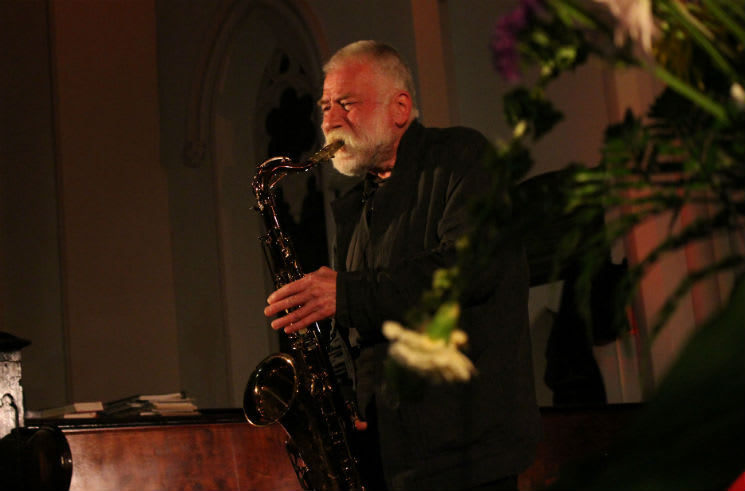For all the accomplished musicians you'll come across at a festival like Halifax's OBEY Convention, it's still rare to experience a performer who seems to have complete, total command over their instrument. Obviously, an instrument is nothing without its player, but even an accomplished performance is less about authority than a dialogue between human and machine.
The voices of Peter Brötzmann's machines — his tenor and soprano saxophones, his weapons of choice at last night's OBEY set — are certainly powerful. Without microphones or accompaniment, they filled the interior of Fort Massey United Church with squeals, howls and fiery force. It's one thing to hear them (and, for several pieces, I chose to do just that, lying down on the church pew and soaking in their harsh, beautiful timbre); it's another to see how a master makes them his own, twisting and turning them into sounds and sequences that stir and echo.
Though the German jazz legend is now 74, Brötzmann's hands and fingers still move with force and focus, and in their dashes across his instruments' frames he rushes through an avalanche of tonal possibilities in mere seconds. Yet for all the noise, you never lose the structures in his music; free jazz, after all, doesn't mean boundless music, and Brötzmann builds patterns sequence by sequence, only to turn around and break them up again just as they threaten to grow too repetitive. It made for a thrilling solo performance — his last of a North American tour — that, even at an hour's length plus encore, still felt too short.
The voices of Peter Brötzmann's machines — his tenor and soprano saxophones, his weapons of choice at last night's OBEY set — are certainly powerful. Without microphones or accompaniment, they filled the interior of Fort Massey United Church with squeals, howls and fiery force. It's one thing to hear them (and, for several pieces, I chose to do just that, lying down on the church pew and soaking in their harsh, beautiful timbre); it's another to see how a master makes them his own, twisting and turning them into sounds and sequences that stir and echo.
Though the German jazz legend is now 74, Brötzmann's hands and fingers still move with force and focus, and in their dashes across his instruments' frames he rushes through an avalanche of tonal possibilities in mere seconds. Yet for all the noise, you never lose the structures in his music; free jazz, after all, doesn't mean boundless music, and Brötzmann builds patterns sequence by sequence, only to turn around and break them up again just as they threaten to grow too repetitive. It made for a thrilling solo performance — his last of a North American tour — that, even at an hour's length plus encore, still felt too short.
